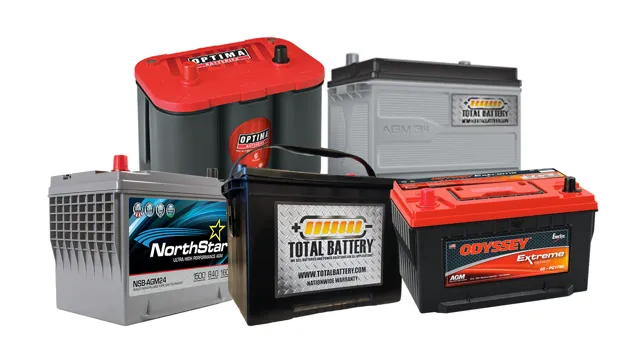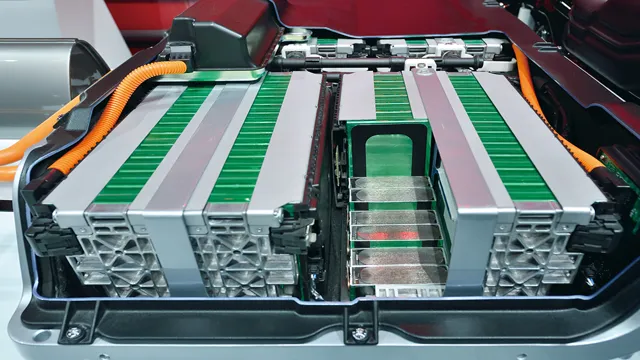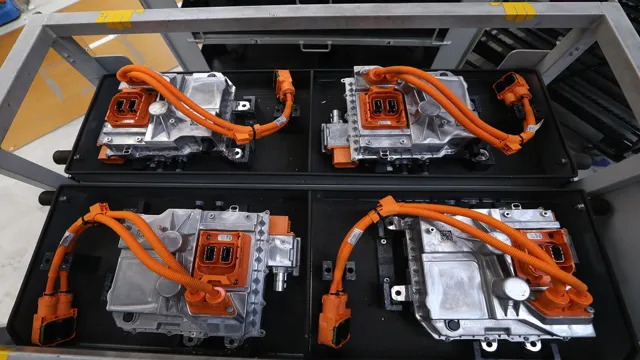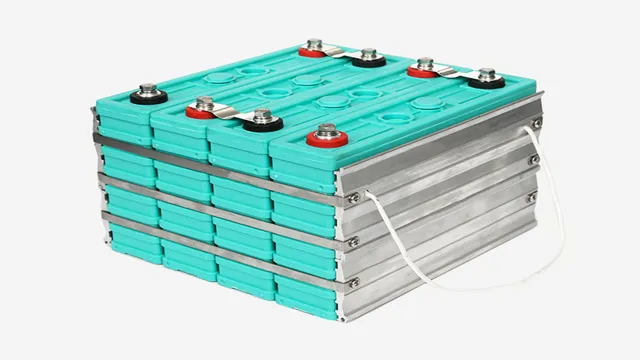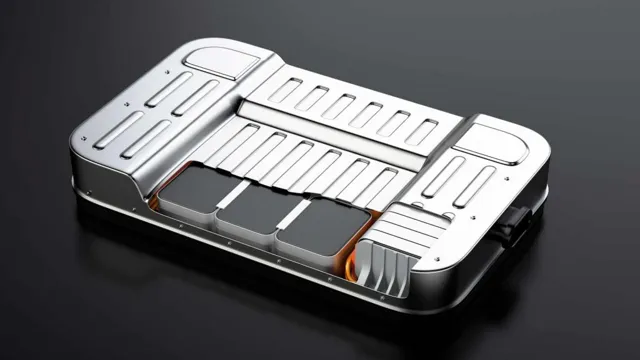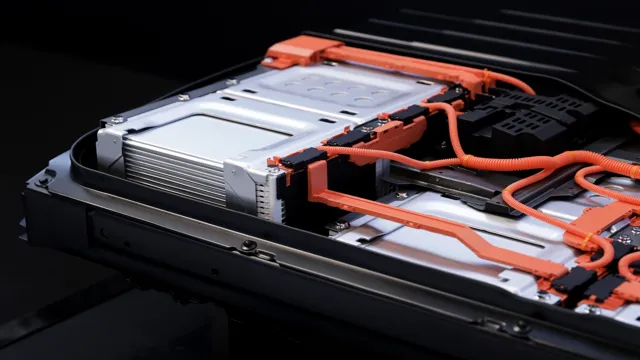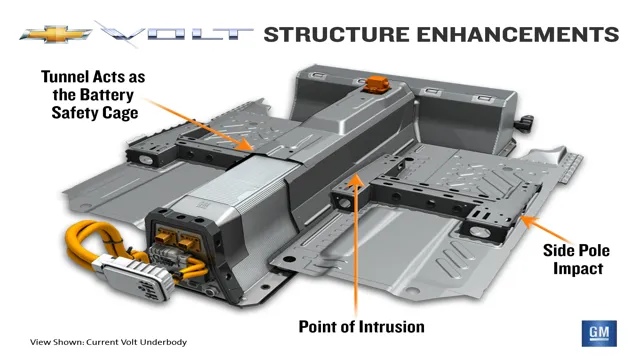Revving up your knowledge: A comprehensive guide to the various types of electric car batteries
Electric cars have become increasingly popular in recent years, offering a sustainable alternative to traditional gasoline-powered vehicles. However, one crucial component of electric cars is their battery system. There are various types of electric car batteries available in the market today, each with its unique advantages and disadvantages.
Understanding the different types of electric car batteries can help you make an informed decision when purchasing an electric car or looking to replace its battery. In this blog, we will discuss some of the common types of electric car batteries available and their features.
Lead-Acid Batteries
When it comes to electric car batteries, there are several different types to consider, including lead-acid batteries. Lead-acid batteries use a mixture of sulfuric acid and water to store energy. They are the oldest and most established type of battery used in vehicles, but they are also the heaviest and have a limited lifespan.
However, they are still commonly used in hybrid and electric vehicles due to their low cost and reliability. While they may not offer the same performance as newer battery technologies like lithium-ion, lead-acid batteries continue to be a popular choice for powering electric cars. So if you’re in the market for an electric vehicle, it’s important to understand the different types of batteries available and their pros and cons, including lead-acid batteries.
Reliable and Affordable
Lead-acid batteries have been a popular choice for many people for years due to their reliability and affordability. These batteries are designed to deliver a steady current for extended periods, which makes them ideal for use in vehicles, boats, and backup power systems. While some newer battery technologies may offer longer lifespans or higher energy densities, lead-acid batteries remain a practical and cost-effective option for many applications.
Plus, they can be easily recharged and are widely available, so replacements are easy to source in the event of a failure. Whether you need a reliable battery for your car, boat, or backup power system, a lead-acid battery is definitely worth considering.
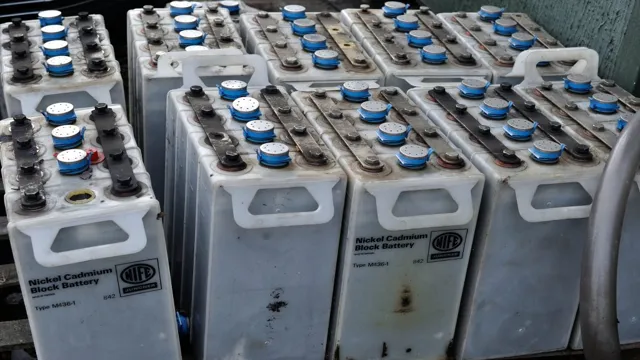
Heavy and Limited Range
Lead-Acid Batteries When it comes to heavy and limited range batteries, lead-acid batteries come to mind. These batteries are commonly used for cars, boats, golf carts, and other similar vehicles. They are heavy, bulky, and have a limited range, making them less efficient compared to other types of batteries.
However, they are affordable and have been used for decades. Lead-acid batteries are made up of lead plates and sulfuric acid. They work by converting chemical energy into electrical energy.
The downside of lead-acid batteries is that they require regular maintenance and can be hazardous if not disposed of properly. Despite their limitations, lead-acid batteries remain a viable option for some applications and industries.
Nickel-Metal Hydride Batteries
Nickel-metal hydride (NiMH) batteries are one of the types of electric car batteries. These rechargeable batteries use a combination of nickel, hydrogen, and other metals to store and release energy. They have a higher energy density than lead-acid batteries and don’t have the same environmental concerns as lithium-ion batteries.
NiMH batteries are also less expensive than lithium-ion batteries, making them a popular choice in hybrid electric vehicles. However, they are a bit heavier and don’t last as long as lithium-ion batteries. Despite this, they are still a reliable and efficient option for electric cars and are used in some models today.
Moderately Priced
Nickel-metal hydride batteries are a great option for those seeking a moderately priced rechargeable battery. They have a higher energy density than nickel-cadmium batteries, which means they can hold more energy in a smaller package. This makes them a popular choice for portable devices such as digital cameras, remote controls, and power tools.
One advantage of nickel-metal hydride batteries is that they do not suffer from the “memory effect” that can plague nickel-cadmium batteries. This means that they can be recharged at any point in their discharge cycle without having to go through a full cycle. However, it is important to note that nickel-metal hydride batteries have a slightly lower overall energy density compared to lithium-ion batteries, although they can still provide a solid and reliable source of power.
Ultimately, if you’re looking for a battery option that offers a good balance between performance and cost, a nickel-metal hydride battery might be the perfect fit for you.
Lightweight but Limited Range
Nickel-Metal Hydride batteries are often regarded as a better alternative to the traditional Nickel-Cadmium batteries. These batteries offer a lightweight design while still providing decent power storage capacity. However, their range is still lower compared to newer technologies like Lithium-Ion batteries.
These batteries use a hydrogen-absorbing alloy instead of the toxic cadmium, which makes them more environment-friendly. Moreover, they are rechargeable, making them an economical choice for devices that require constant power. Despite these advantages, Nickel-Metal Hydride batteries still have some limitations.
They are not suitable for high-drain devices and have a limited lifespan. Additionally, they can gradually lose their capacity over time, which can affect the performance of the device. Overall, Nickel-Metal Hydride batteries are a great choice for low to moderate power personal electronics, but for devices that require high power for longer durations, Lithium-Ion batteries are the better option.
Lithium-Ion Batteries
If you’re looking into buying an electric car, you might be wondering what types of batteries they use. The most common type of electric car battery is the Lithium-Ion battery. These batteries are lightweight, have a high energy density, and can be charged quickly.
They also have a long lifespan, which is especially important for electric cars since replacing the battery can be expensive. There are other types of batteries used in electric cars, such as Nickel-Metal Hydride and Lead-Acid batteries, but these are less common than Lithium-Ion. Regardless of the type, though, all electric car batteries rely on the basic principles of storing energy and releasing it to power the car’s electric motor.
Expensive but High Performance
Lithium-Ion batteries are often known for their high performance and durability. Although they may come with a hefty price tag, they can offer long-lasting power and are widely used in many electronic devices. These batteries are made up of a combination of lithium, cobalt, and nickel, which work together to provide a high power output.
While they can be more expensive than other types of batteries, they are worth the investment, especially for devices that require a lot of power in a compact size. Think about it like investing in a high-performance sports car – while it may come at a higher cost, it offers top-of-the-line performance and long-lasting durability. If you’re in the market for a new device that relies on battery power, consider choosing one with a lithium-ion battery for the best performance.
Lightweight and Longer Range
When it comes to portability and longevity, lithium-ion batteries are the way to go. These batteries are lightweight, making them perfect for use in devices such as smartphones, laptops, and even electric vehicles. Furthermore, the development of lithium-ion technology has led to improvements in battery life, allowing devices to last much longer on a single charge.
This is because lithium-ion batteries have a higher energy density than traditional batteries, meaning they can store more energy in a smaller package. This also allows for longer ranges in electric vehicles, making them a more practical option for daily use. Moreover, lithium-ion batteries are known for their high charge retention and have a minimal self-discharge, meaning they can hold a charge for extended periods without losing their energy.
In conclusion, the advancements in lithium-ion technology have revolutionized the electronics industry, providing longer-lasting, more efficient batteries that are lightweight and easy to carry around.
Solid-State Batteries
One of the most important components of an electric car is its battery, and there are a few different types available on the market. One promising option is solid-state batteries. These batteries use solid electrolytes instead of the liquid electrolytes used in traditional lithium-ion batteries.
This means they can potentially store more energy in a smaller space, have a longer lifespan, and are less prone to overheating or catching fire. Solid-state batteries also have the potential to charge much faster than traditional lithium-ion batteries. However, they are currently more expensive to produce and are not yet widely available on the market.
As technology continues to advance, solid-state batteries may become a more common option for electric cars in the future.
Next-Generation Technology
Solid-state batteries are the next-generation technology that is expected to revolutionize the field of energy storage. The conventional lithium-ion batteries have been used in various applications for many years but lack the desired efficiency, safety, and dependability. However, solid-state batteries, which are composed of solid electrolytes instead of liquid or gel, have emerged as the solution to these issues.
Solid-state batteries offer high energy density, faster charging times, and increased safety as they are less prone to leakage or thermal runaway. Plus, the use of solid-state batteries will enable the production of smaller and lighter devices that have a more extended battery life, making them ideal for portable devices, electric vehicles, and even powering grids. The demand for solid-state batteries is increasing rapidly as more companies realize the potential of this technology.
This new battery technology will usher in a new era of energy storage and transform various industries, making them more efficient, environmentally friendly and sustainable.
Higher Energy Density and Safety
Solid-State Batteries Solid-state batteries are a new technology that promises to revolutionize the battery industry. Unlike traditional batteries that use liquid electrochemical cells, solid-state batteries use solid-state electrolytes, which drastically improve energy density and safety. With a higher energy density, solid-state batteries can store more energy while taking up less space.
Additionally, the solid-state electrolytes are less flammable than traditional liquid electrolytes, reducing the risk of explosions and fires. Furthermore, solid-state batteries have a longer lifespan than their liquid counterparts, making them more sustainable and economical in the long run. Although solid-state batteries are in the early stages of development, they have the potential to transform the way we power our daily lives, from portable devices to electric vehicles.
The future of battery technology looks bright, and solid-state batteries are leading the way.
Conclusion
In conclusion, choosing an electric car battery is not a one-size-fits-all decision. With a range of options including lithium-ion, nickel-metal hydride, and even solid-state batteries on the horizon, it’s important to consider factors like cost, range, and environmental impact when making a choice. But no matter what type of battery you choose, always remember: the real power behind any electric car is the driver’s commitment to reducing carbon emissions and building a cleaner future for all.
“
FAQs
What is a lithium-ion battery?
A lithium-ion battery is a type of rechargeable battery commonly used in electric cars, known for its high energy density and long lifespan.
What is a lead-acid battery?
A lead-acid battery is another type of rechargeable battery sometimes used in electric cars, known for its low cost but shorter lifespan compared to lithium-ion batteries.
What is a solid-state battery?
A solid-state battery is a newer type of battery technology that uses a solid electrolyte instead of a liquid or gel electrolyte, offering higher energy density and faster charging times than traditional lithium-ion batteries.
What is a nickel-metal hydride battery?
A nickel-metal hydride battery is another type of rechargeable battery sometimes used in electric cars, known for its lower cost and safety compared to lithium-ion batteries, but with lower energy density and shorter lifespan.

